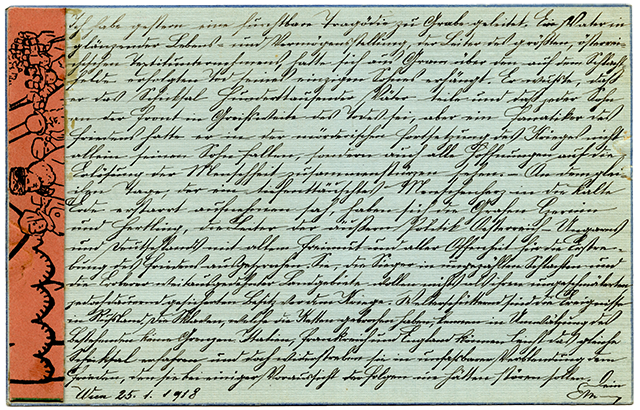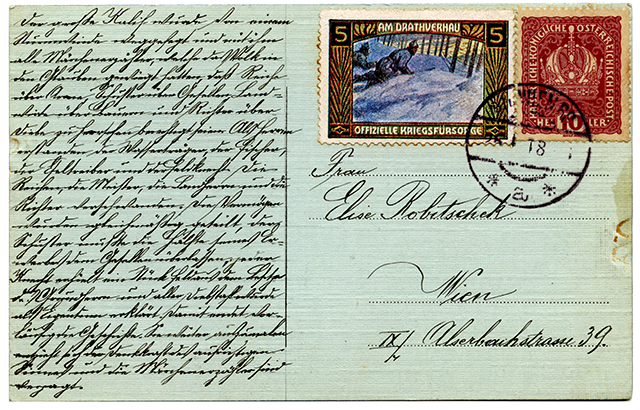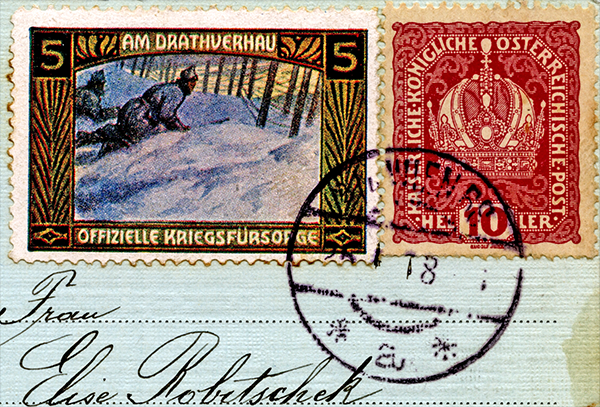
Home | Card Index | | | |
 Home | Card Index | | | | |
Eman Robitschek to Elise Robitschek - January 25, 1918Transcription and translation by Werner Sepper. |
 |
|
|
Ich habe gestern eine furchtbare Tragödie zu Grabe geleitet. Ein Vater in glänzender Lebens= und Vermögensstellung, der Leiter des grössten, österreichischen Textilienunternehmens, hatte sich aus Gram über den auf dem Schlachtfelde erfolgten Tod seines einzigen Sohnes erhängt. Er wusste, dass er das Schiksal Hunderttausender Väter teile und dass jeder Sohn an der Front in Greifsweite des Todes sei, aber ein Fanatiker des Friedens hatte er in der mörderischen Fortsetzung des Krieges nicht allein seinen Sohn fallen, sondern auch alle Hoffnungen auf die Erlösung der Menschheit zusammenstürzen sehen. An dem gleichen Tage, der ein tiefenttäuschtes Menschenherz in die kalte Erde erstarrt aufnehmen sah, haben sich die Grafen, Czernin und Hartling, die Leiter der äusseren Politik Österreich -Ungarns und Deutschland mit allem Freimut und aller Offenheit für die Erstrebung des Friedens ausgesprochen. Sie, die Sieger in ungezählten Schlachten und die Eroberer weitausgedehnter Landgebiete wollen nichts als ihren ungeschmälerten, jedoch dauernd gesicherten Besitz vor dem Kriege. Welterschütternd sind die Ereignisse in Russland. Die Sklaven, welche die Ketten gebrochen haben, kennen in Umwälzung des Bestehenden keine Grenzen. Italien, Frankreich und England können leicht das gleiche Schiksale erfahren und doch widerstreben sie in unfassbaren Verblendung dem Frieden, den sie bei einiger Voraussicht der Folgen nie hätten stören sollen. |
|
|
Yesterday I lead a horrible tragedy to the grave. A father in resplendent position of life and fortune, the leader of the largest Austrian textile firm, had out of grief over the on the battlefield killed only son hanged himself. He knew, that he shared the fate of hundred thousands of fathers and that every son on the front is within reach of death, but as a peace fanatic he not only saw the fall of his son as the murderous continuance of the war, but also the destruction of all hopes for the redemption of mankind. On the same day that saw a deeply disappointed heart being accepted into the cold earth, the counts Czernin and Harding, the leaders of the Austrian Hungarian and German foreign offices, spoke out with all frankness and openness for the attainment of peace. They, the victors of uncounted battles and the conquerors of vast territories, do not want anything more than their undiminished, although continuously secured domains, as before the war. Earthshaking are the events in Russia. The slaves, who broke their chains, do not put any limits on the upheaval of the existing order. Italy, France and England could easily share that fate and yet they resist peace with inconceivable blindness, which they should never have, with a little foresight of the consequences, disrupted. | |

|
 |
|
Postcard Blog Personal Identity An Image for Both Sides of the Card On the front of the card, this picture spills down the left-hand edge. It may be thought of either as the funeral procession referred to on the front of the card, or the leader of the Russian revolution at the head of the newly liberated Russian people, alluded to on the address side of the card. |

|
 |
 |

|
 |
|
Der grosse Kalif wurde von einem Sturmwinde weggefegt und mit ihm alle Märchenerzähler, welche das Volk in den Glauben gewiegt hanen, dass Reiche über Arme, Schuster über Gesellen, Landwirte über Bauern und Richter über Diebe zu herrschen berechtigt seien. Als Herren erstanden der Wasserträger, der Fischer, der Eseltreiber und der Feldknecht. Die Reichen, die Meister, die Landherrn und die Richter verschwanden. Die Vermögen wurden gleichmässig geteilt, der Schuster musste die Hälfte seines Erwerbes dem Gesellen überlassen, jeder Knecht erhielt ein Stück Feld aus dem Besitze des Grundherrn und aller Diebstahl wurde als Eigentum erklärt. Damit endet vorläufig die Geschichte. Sie weiter auszumalen entzieht sich der Denkkraft des aufrichtigen Sinnes und die Märchenerzähler sind verjagt. |
|
|
The great caliph was swept away by a heavy gale and with him all the story tellers who had instilled into the people the belief that the rich over the poor, master cobblers over journeymen, landowners over farmers and judges over thieves are justified to rule. The water bearers, the fishermen, the donkey drovers and field hands rose as the masters. The rich ones, the artisans, the land owners and the judges disappeared. Their assets were divided equally, the cobbler had to cede half of his possessions to the journeymen, every field hand received a piece of land from the possession of the land owner and everything gained by theft was declared legal property. With this the story ends. To continue to paint it is beyond a sincere intellect and the story tellers are chased away. |
|

|
 |
|
History as Parable
Personal Experience as a Mirror of World Experience |

|
 |

|
|
Contribution to the War Relief Fund Charity Label Usage Intended Symbolism Last revised 29 SEPT 2013 |

|
 |
|
©2013 by Charles M. Nelson All rights reserved. |